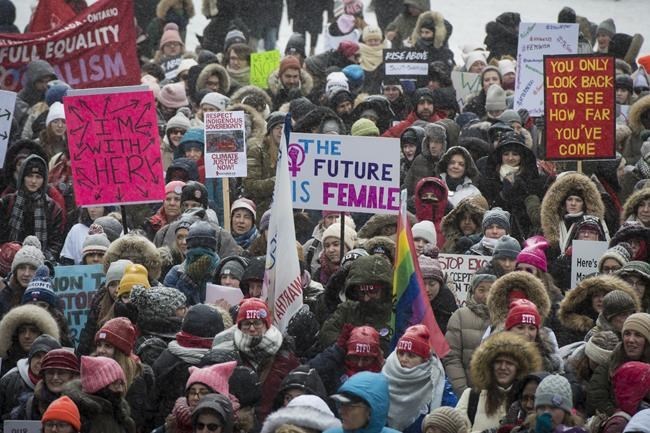WASHINGTON — Canadian support for the principle of equal rights for women and men is among the highest in the world — but in practice, archaic attitudes towards gender roles are still alive and well both at home and around the globe, a new survey suggests.
Respondents to the international Pew Research Center poll released Thursday expressed overwhelming support for the concept of gender equality — 93 per cent of Canadians surveyed ranked it as "very important," second only to Sweden at 96 per cent.
In more practical terms, however, the survey found a significant gap between men and women when it comes to which gender they believe enjoys a higher quality of life: 69 per cent of women in Canada said men have a better quality of life, compared with 49 per cent of Canadian men who said the same thing.
"It is the case, I think, that people in Canada really see men and women having equal rights as very important. And they're somewhat more optimistic than other countries that women will eventually have the same rights as men," said Pew research associate Janell Fetterolf.
"At the same time, people do recognize that it's not necessarily the case now in some of these situations."
A surprising 11 per cent of Canadians said men should have more right to a job than women at times when work is scarce, compared with 88 per cent who disagreed. In the U.S., the ratio was similar: 13 per cent agreed with favouring men, compared to 85 per cent who felt differently.
Elsewhere in the world, a majority of people surveyed in countries like India, Tunisia and Nigeria reported the inverse sentiment, skewing the 34-country median to 56 per cent of all respondents who preferred men having a fast-track on scarce jobs, and 40 per cent who disagreed.
The results suggest that the issue of equality, much like environmental concerns over the last 20 years, have tended to attract a level of outward public support that can suddenly dissolve when people's economic well-being is under threat.
"That question in particular about the specific context of job scarcity gives us a really interesting insight into how people feel," Fetterolf said.
"Gender equality is something that people feel very strongly about and think is important, but it is still the case that there are instances where people might prefer there to be inequality."
The survey was conducted in 2019 as part of the centre's annual Global Attitudes Survey, the results of which the institute gradually releases annually over the course of the following year. Interviews with 1,004 adult respondents in Canada were conducted by phone between May 27 and July 10 of last year, and the Canadian portion carries a margin of error of plus or minus four percentage points.
About two-thirds of respondents in Canada said men have more access to high-paying jobs, while just two per cent said the same thing about women. Thirty-one per cent said opportunities for both genders are about equal.
Only 43 per cent said men have more opportunities to be leaders in their community; 54 per cent said the balance is about equal, while three per cent said women have the advantage.
The research also shows that some respondents in Canada still cling to long-standing perceptions about gender roles: 22 per cent said men have more influence over household financial decisions, compared to 11 per cent who said women control the purse strings. Sixty-four per cent said the balance is equal.
Women exert more control over child-rearing decisions, 37 per cent of Canadians said, compared with just three per cent who said the same thing about men. Fifty-eight per cent called it a draw.
Three-quarters of Canadians surveyed said marriages are more satisfying when both partners work and share household duties, compared with 15 per cent who preferred to see the husband as the provider and the wife at home with the children.
Perhaps not surprisingly, "people younger than 30 are more likely than those aged 50 and older to say a marriage where both the husband and wife have jobs and take care of the house and children is the more satisfying way of life," the centre said.
Canadian women are also less optimistic than their male counterparts when it comes to the future of gender equality: 88 per cent of female respondents said they either are or expected to be treated equally, compared with 93 per cent of men.
This report by The Canadian Press was first published April 30, 2020.
— Follow James McCarten on Twitter @CdnPressStyle
James McCarten, The Canadian Press



